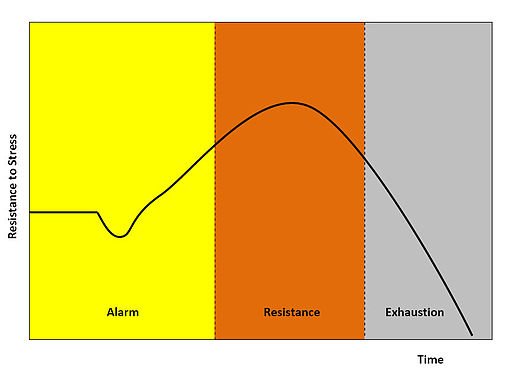Under Pressure: The 3 Stages of Stress Resistance
How much stress is too much? We can handle a good amount of stress each day. But over time, its pressure can lead to reduced performance, increased frequency of illness, and other common health problems.
But it's not the external stressors that have this effect on us...it's actually our own body's response to stress that can lead to problems if we're exposed to it for too long.
The General Adaptation Syndrome (GAS) was first introduced by stress researcher Hans Selye. It describes the three stages of the body's natural response to stress and the roles that the nervous and hormonal systems play in this process.
3-stages in the reaction to stress:
- Alarm
- Resistance
- Exhaustion

In the Alarm stage, the nervous and hormonal systems respond to a stressor in their normal manner to meet the body's demands under stress.
This includes the release of adrenaline, noradrenaline, and cortisol.
These chemicals have different effects that include:
- Mobilizing stored energy (glucose)
- Stopping anabolic (growth/repair) processes
- Inhibiting digestion
- Suppressing immunity
- Inhibiting reproductive functions
The Alarm stage is the normal reaction to stress. Our bodies are uniquely designed to handle short-term and immediate stressors, and once those stressors are eliminated, we return to our normal resting state.
The Resistance stage begins if the stress persists, causing repeated activation of the hormonal system with little recovery. There are different types of stress that we can be exposed to on a regular basis such as physical, nutritional, and environmental stress.
As the stress continues, the hormonal system becomes desensitized by chronically elevated levels of cortisol and is no longer signaled to stop the stress response. This results in hormonal imbalance issues that can further contribute to secondary health problems.
This is the beginning of the negative effects that long-term stress can create. When stressors aren't addressed, the body struggles to keep up.
The Exhaustion phase occurs when we're no longer able to meet the demands that are being placed upon us.
This can lead to a decrease in the manufacture and secretion of steroidal hormones. It can alter the fight-or-flight response of the body and result in other health issues that include the following:
- Anxiety
- Gastrointestinal disorders
- Hormonal imbalances
- Immune disorders
- Migraine headaches
- Insomnia
- Sexual dysfunction
This model can help us define the level of stress we're under and at what stage we might be in the resistance process. The further along you are in these stages the higher the risk of developing health problems such as those listed above.
Powering along in spite of the stressors you face each day may work in the short-term, but over time, you may run the risk of exhausting your body's ability to resist those stressors.
Many health problems can take time to develop. The 3 stages of stress resistance give us some perspective on how those processes take place as a result of being under pressure from chronic stress.
This is a basic introduction to the General Adaptation Syndrome. There's much more that can be discussed on this topic. But hopefully, it helps you understand that some health problems develop over time—like "slow-motion" injuries.
So looking at those things that are affecting us in the long-term can shed light on what solutions will be the most effective in providing relief from the pressures of life.
References:
- Rubin, Josh & Jeanne. Endocrine System. Metabolic Blueprint Course. EastWestHealing.
- Sapolsky, Robert M. Why Zebras Don't Get Ulcers. New York: St. Martins Griffin.
Image Source:
- General Adaptation Syndrome graphic; David G. Myers (Exploring Psychology 7th ed. (Worth) page 398.) [CC BY 3.0], via Wikimedia Commons